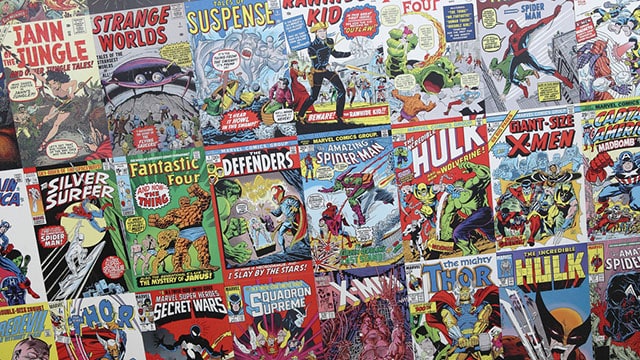Mississauga Comic Expo Showcases Colourful Canadian Characters
Published October 21, 2017 at 11:07 pm

You’ve probably heard of Captain America and Spiderman, but Canada has its own comic book heroes.
“Captain Canuck” and the “Pitiful Human Lizard” are just two of the colourful characters Mississauga Central Library plays host once a year to the Mississauga Comic Expo, “MCX”, where comic writers and illustrators showcase their work for a local audience. Crowds swarm from floor to floor and a new generation is introduced to Canadian comic books. All the while, Canada’s comic books themselves are in the midst of a generational shift.
The Canadian comic book scene may not be as “flashy” or lucrative as writing for big name U.S. brands. Much of the work is self-published, which means creators do the leg work of promotion on their own.
“We have a resurgence of Canadian superheroes…As the world gets [more connected], people really want a stronger sense of community,” says comic illustrator Ricky Lima, whose work depicting Canadian events has been distributed by Heritage Mississauga.
Among the Canadian creators at MCX was Marta Chudolinska, who describes herself as “fascinated by narrative imagery.” She and her family immigrated from Pruszkow, Poland in 1991 and “the experience of dislocation has inspired her to explore and to cherish the diverse regions of Canada, from east to west.”
Chudolinska doesn’t dispute the view that comic books are often perceived as being for a male audience, and she says she doesn’t write specifically for females. Still, strong female characters are prominent in her work, such as her graphic novel Back + Forth.
Her work is a mix of self-published content and work produced through publishers.
“[My work] ranges from personal stories to fiction to sci-fi…I just expect that there’s a really diverse audience…I try not to shy away from anything,” she said.
Some of her work is self-published, and some is written for publishers. Self-publishing is a trade-off, she says, because while it can be a more time-consuming process, it allows artists and writers more creative freedom.
Toronto has a burgeoning market for comics, according to Chapterhouse Publishing, which first opened in 2015 on a mission to get Canadian content more exposure.
According to its website, “Chapterhouse provides a venue for…creative voices from Canada and the world, both in our superhero universe and in our line of inspiring and inventive creator-owned titles.”
Jason Loo, a writer and artist at Chapterhouse Comics whose work includes the “Pitiful Human Lizard”, an “offbeat Canadian superhero set in Toronto,” said while he supports bringing more Canadian creators into the comic book market, his target audience is not just Canadians.
“You don’t have to be from Toronto to appreciate the story. It helps, absolutely, but I also talk with fans from other provinces and the US. [Pitiful Human Lizard] is about just an average guy who’s trying to reach out for his dreams.”
Still, he doesn’t downplay his Canadian inspiration.
“I felt like Toronto needed a superhero…I think we’re a city to be reckoned with. We need to be celebrated somehow, and living in Toronto gives me great access to references all around me.”
For Chapterhouse, he said, “Everything just kind of clicked.” He credits a kickstarter campaign with bringing back old favourites among Canadian superheroes, like “Captain Canuck” (who, bombshell announcement at the event revealed, will eventually have a live-action movie version), and creating space for a new generation.
Mississauga-based comic creator Adam Gorham has some straightforward advice for aspiring Canadian creators.
“I get asked a lot how to ‘break in’ to [a career making] comics…There’s no one way, there’s no path. You just have to make comics.”
Gorham says smaller-scale local events are great for Mississauga-based creators because they’re more family-oriented. The bulk of visitors he met were parents with their children, and many said they came to check out MCX for their kids.
He echoes Loo in saying that making comics for a Canadian audience doesn’t mean being in-your-face about being Canadian.
“I don’t feel the need to hit people over the head with [Canadian stereotypes.]…I wouldn’t want to be pandered to in that way as a reader and so I wouldn’t want to do it as a creator.”
His own career extends beyond Canada to include art for Marvel comics, Archie, and U.S.-based Image Comics.
According to each of these creators, then, there’s no clear, consistent answer about how to write for a Canadian audience, or a Mississaugan audience for that matter, but that’s because the Canadian comic reader’s identity, like the Canadian identity overall, is diverse. Characters and readers break boundaries historically associated with comics’ classic superheroes and deal instead with average people.
Loo says that audience expansion is the key to his success.
“There are many ways to identify ourselves as Canadian and when people pick up my comic…they can see themselves, no matter what background.”
During a Q&A session, one audience member asked Canadian screenwriter and How to Train Your Dragon actor Jay Baruchel if he thought there was too much emphasis on diversity for its own sake rather than to serve the stories.
Without hesitating, Baruchel said: a good story comes first, but good stories benefit from diversity.
That, in short, is the Canadian comic creators’ philosophy.
INsauga's Editorial Standards and Policies


